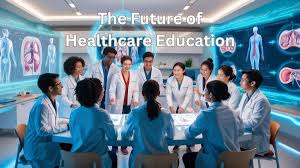AI's Next Frontier: Personalized Healthcare and Education
Science & Technology TechnologyPosted by NewAdmin on 2025-01-26 10:00:03 |
Share: Facebook | Twitter | Whatsapp | Linkedin Visits: 33

Artificial Intelligence (AI) is entering a transformative phase, redefining personalized healthcare and education with unparalleled advancements. The integration of AI into these fields holds immense promise, addressing critical challenges while enabling more tailored solutions for individuals worldwide.
In healthcare, AI is becoming a cornerstone for diagnostics, treatment planning, and patient care management. Technologies like machine learning algorithms can analyze vast amounts of medical data, identify patterns, and assist in early disease detection. For example, generative AI models, such as those developed by Google DeepMind, are being trained to predict protein structures and uncover molecular interactions crucial for drug discovery. In oncology, AI-powered tools can analyze imaging data, providing doctors with insights for precise cancer diagnoses and personalized treatment plans. Additionally, wearable devices equipped with AI-driven health monitoring systems are empowering individuals to track vital signs in real time, potentially preventing severe health crises.
Beyond diagnostics, conversational AI systems, such as ChatGPT and similar technologies, are revolutionizing mental health care. These tools offer scalable, immediate mental health support, addressing the shortage of therapists and counselors. AI-driven platforms are also enabling telemedicine consultations, streamlining access to medical expertise across remote and underserved regions.
In education, AI is reshaping learning experiences by tailoring content to individual needs. Adaptive learning platforms use AI algorithms to analyze a student's strengths, weaknesses, and progress, creating customized lesson plans that ensure effective knowledge retention. Companies like OpenAI are contributing to the development of educational tools that make complex topics more accessible. Virtual tutors, powered by conversational AI, provide students with 24/7 assistance, answering questions and offering explanations across various subjects. Such tools are particularly beneficial in bridging learning gaps and supporting students in regions with limited access to quality education.
AI also enhances inclusivity in education by providing tools for students with disabilities. Speech recognition software, text-to-speech applications, and real-time language translation tools ensure that learning resources are accessible to everyone, regardless of physical or linguistic barriers. Moreover, immersive technologies like augmented and virtual reality, combined with AI, are creating interactive learning environments that simulate real-world scenarios, making education more engaging and effective.
Despite these advancements, challenges remain, including ethical considerations, data privacy concerns, and the need for regulatory frameworks to guide the responsible use of AI in sensitive domains like healthcare and education. Companies leading AI innovation are working to address these concerns, ensuring transparency, fairness, and accountability in AI-driven systems.
The future of AI in personalized healthcare and education is promising, with the potential to drastically improve outcomes and accessibility. As the technology evolves, it holds the key to unlocking a new era of human-centered innovation, transforming how we approach learning and health in the 21st century.
Search
Categories
Recent News
- Copper's Slump: A Buying Opportunity or Market Reset?
- Bengaluru Metro's Pink Line Expansion: A Breath of Fresh Air for Commuters
- Ghana's Youth Drug Crisis: A National Tragedy
- India's Services Sector Soars: A Boost for the Economy
- Gold Bond Investors Face New Tax Reality
- Bengaluru Colleges Face Uncertain Future: The Looming Fee Hike Crisis
- Anna University Convocation: Minister's Absence Sparks Speculation
- GATE 2026: Countdown to the Crucial Exam